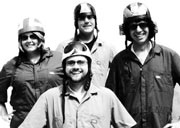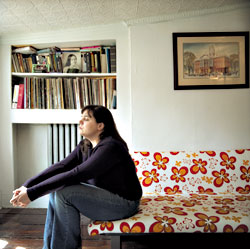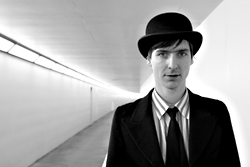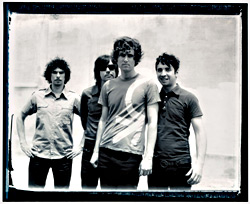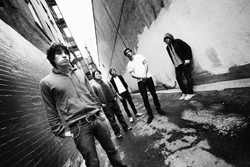APPLES IN STEREO
CLINIC, KAITO
Showbox, 628-3151, $15/$12 adv.
8 p.m. Tues., Oct. 8
IF YOU’VE PAID even a little attention to underground rock over the past few years, chances are you know Robert Schneider as the frontman of the Apples in Stereo, a guy responsible for some of the scene’s best, most artfully realized pop records. If you’ve spoken to him, even for a minute or two, chances are you might think of him as a frenzied speed freak.
Schneider’s on the phone from his new home in Lexington, Ky. (he and wife/ drummer Hilarie Sidney and their young son just moved there from the Apples’ longtime Denver base), and he’s talking two miles a minute, barely taking a breath between sentences, moving from subject to subject like an Olympic decathlete.
Maybe Velocity of Sound, the Apples’ new album, should have been a hint of all this. The album, their fourth, breaks some new ground for these self-confessed music geeks, stepping away from the ornamental arrangements and detailed production that have defined their previous efforts (like 2000’s lush The Discovery of a World Inside the Moone), and embraces a raw, stripped-down caffeine buzz that seems to prize impact above nuance. The title doesn’t lie: This is fast, loud guitar pop, as hard as a diamond and as pithy as a Ramones single.
“On the last few records, I got a little overboard in basically throwing in everything,” Schneider explains with a gasp. “Lots of horns and pianos and slide guitars and flutes and whistles and toy pianos. I have such a love of classic 20th-century pop albums, and I have such a great desire to make classic music like the classic music I love. But I never really distinguished between the classic music I love and the style of the music that I was doing; I tended to go a little bit more towards the sounds on those records. The songs were us, but on top of us there’s this kind of mishmash of classic pop from the ’60s, ’70s, and ’80s that was kind of thrown in there. And I love that.” He takes what must be his first pause.
“But between our last album and now, I started to feel uncomfortable with that. If we want to do something really great—if we want to make a really great work, a really great piece of art— it’s not gonna be by referencing other people’s great art. It’s gonna be by doing something totally different that really bears little similarity to those bands.”
Schneider’s not entirely on the mark there: Velocity still sounds like the Apples, meaning it still sounds like the work of people really into Pet Sounds and Revolver and White Light/White Heat. But it’s great to hear the band stretch out and try something new, even if it’s just a different permutation of a set of familiar influences.
The change is just in time, too. The Apples’ rise to indie-rock celebrity has mirrored the rise of Elephant 6, a sprawling group of vaguely like-minded bands that began life as a way for Schneider and his friends (including members of Neutral Milk Hotel and Olivia Tremor Control) to pool their resources and make weird psychedelic pop records together. In time, the loose organization grew to encompass a seemingly infinite series of (often Schneider-produced) side projects and one-off outfits—it’s highly possible college radio never aired an E6-free hour of programming in the late ’90s—and the brand’s potency diminished. In late 2000, Schneider and Sidney unofficially left the group.
“I have no idea what’s going on with Elephant 6, and I have no involvement in it,” he says now. “It became so large that it was hard to control, and I suppose, on my part, it got so far from our unique vision that it became hard to appreciate it while still holding onto the idea of controlling it. For me, I needed to kind of withdraw from it and get distance from it to be able to appreciate it.”
The same seems to be true of the Apples themselves, gaining distance from their past to stake out a future. “A couple years ago, aside from the Elephant 6 thing, I stopped producing other bands, and in that, I became much more into the Apples and much more into what we were doing. I think I was spreading myself a little thin, putting my own art on the level of other people’s art, and it was hard for me to see what was individual. I just got a little burned out on oldies—the challenge wasn’t there anymore.”
Velocity may not sound like a challenge, but for Schneider and the band, it might just be a new beginning.

THE APPLES IN STEREO
Velocity of Sound
(SpinArt)
No one much likes to talk about it these days, but about 30 seconds before we were all so New York City hip, most of us were pledging our undying allegiance to the Sloop John oompah-rock of the Elephant 6 collective. It makes us shifty and uncomfortable to think about it now—it’s sorta like being reminded of the tuba player you used to go out with in middle school; you’ve since moved on to much better, cooler things. Apparently, Robert Schneider felt our collective eyes rolling, and he makes a spectacular bid to win us back with album opener “Please,” a jaw-dropping, cherry-red drag racer of a song that whips so fast around a tight little melody it practically collides straight into the next track: the even higher octane “Rainfall.” It’s an incredible rush: The horns are gone, the guitars are amped past burning, and the Apples are playing like a bona fide rock band instead of some goofy, stoned pit orchestra. It’s like the Kinks recording for SST and almost enough to make you wonder why you’ve been wasting the last eight months with that grubby son of a modeling agent. The problem is, now that Schneider’s thrown it into high gear, he’s apparently forgotten how to bring it back down. All of the songs are full-on, amped-up jaw busters, alternately blistering and blustery. Even the ballad “Where We Meet” is punctuated by a searing guitar solo and propelled by giant serrated chords. There’s not nearly enough variety in tone or moderation in assault, and the unfortunate consequence is that Velocity‘s many inspired moments get buried beneath a pile of fuzz boxes. Schneider still has a way with melody (witness the loopy country stomp “Better Days”), but Velocity doesn’t know when to say when. It’s bursting with visceral thrills, but ultimately the all-new Apples are better suited to a quick hot fling than a long, deep relationship. Besides, we’ve already started scamming on that totally hot guy in PolySci. You know—the one
named Electroclash? J. EDWARD KEYES 
